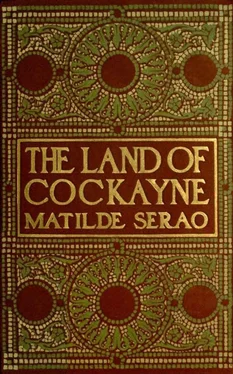Matilde Serao - The Land of Cockayne
Здесь есть возможность читать онлайн «Matilde Serao - The Land of Cockayne» — ознакомительный отрывок электронной книги совершенно бесплатно, а после прочтения отрывка купить полную версию. В некоторых случаях можно слушать аудио, скачать через торрент в формате fb2 и присутствует краткое содержание. Жанр: unrecognised, на английском языке. Описание произведения, (предисловие) а так же отзывы посетителей доступны на портале библиотеки ЛибКат.
- Название:The Land of Cockayne
- Автор:
- Жанр:
- Год:неизвестен
- ISBN:нет данных
- Рейтинг книги:3 / 5. Голосов: 1
-
Избранное:Добавить в избранное
- Отзывы:
-
Ваша оценка:
- 60
- 1
- 2
- 3
- 4
- 5
The Land of Cockayne: краткое содержание, описание и аннотация
Предлагаем к чтению аннотацию, описание, краткое содержание или предисловие (зависит от того, что написал сам автор книги «The Land of Cockayne»). Если вы не нашли необходимую информацию о книге — напишите в комментариях, мы постараемся отыскать её.
The Land of Cockayne — читать онлайн ознакомительный отрывок
Ниже представлен текст книги, разбитый по страницам. Система сохранения места последней прочитанной страницы, позволяет с удобством читать онлайн бесплатно книгу «The Land of Cockayne», без необходимости каждый раз заново искать на чём Вы остановились. Поставьте закладку, и сможете в любой момент перейти на страницу, на которой закончили чтение.
Интервал:
Закладка:
But all at once a long shout of satisfaction burst out from the crowd in all varieties of tone, rising to the most stridulent and going down to the deepest note: the big balcony on the terrace had opened. The people waiting in the road tried to get in at the entrance, those standing there crushed into the court; it was quite a squeeze, all faces were raised, seized by burning curiosity and anguish. A great silence followed. Looking keenly, one could see by the moving of some woman's lips that she was praying, whilst Carmela, the girl with the attractive, worn face and very sad black eyes, played with a black string tied round her neck that had a medallion of our Lady of Sorrows and a forked bit of coral. There was universal silence of expectation and stupor. On the terrace two Royal Lottery ushers had arranged a long narrow table covered with green cloth, and three armchairs behind it for the three authorities to sit in—a Councillor of the Prefecture, the Lottery Director at Naples, and a representative of the municipality. The urn for the ninety numbers was placed on another little table. It is a big urn, made of transparent metal, lemon-shaped, with brass bands going from one end to the other, surrounding it as the meridian line goes round the earth: these shining bands make it strong without spoiling its transparency. The urn is slung in the air between two brass pegs; a metal handle by one, when touched, makes the urn twist round on its axis. The two ushers who had brought out all these things to the terrace were old, rather bent, and sleepy-looking. The three authorities, in great-coats and tall hats, seemed bored and sleepy too, sitting behind the table; the Prefecture Councillor, with his deep, black dyed moustaches, was drowsy: he looked as if he had touched them in in brown on his sleepy dark face; it was the same with the secretary, a youth with a dark beard. These folk moved slowly, like automatons, so that a common man from the crowd called out, 'Move on! move on!' Silence again, but a great wave of emotion when the little boy who was to take the numbers out of the urn appeared on the balcony.
He was a boy dressed in the gray poor-house uniform, a poor little fellow from the serraglio, as the Naples folk call these deserted creatures' asylum, a poor serragliuolo with no father nor mother, a son of parents who from cruelty or want had deserted their offspring. Helped by one of the ushers, the little boy put on a white woollen tunic over his uniform and a white cap, because lottery superstition requires the little innocent to wear innocence's white dress. He climbed nimbly on to a stool, so as to stand as high as the urn. Below, the crowd tossed about: 'Pretty lad, pretty lad!' 'May you be blessed!' 'I commend myself to you and to St. Joseph!' 'The Virgin bless your hand!' 'Blessed, blessed!' 'Holy and old—live to be holy and old!' Everyone said something, good wishes, blessings, requests, pious invocations, prayers. The child was silent, looking from him, his little hand resting on the urn's metal net. At a little distance, leaning against the balcony rail, was another serraglio child, very serious, in spite of his pink cheeks and fair hair cut on the forehead. It was the little boy who was to take out the numbers next Saturday; he came to learn, to get used to the working of the urn and the people's shouts. No one cared about him—it was the one dressed in white for that day to whom all the numerous exclamations were addressed; it was the innocent little soul in white that made that crowd of distracted beings smile tenderly, that brought tears to the eyes of those who hoped in Fortune only. Some women had raised their own boys in their arms, and held them out to the serragliuolo. The tender, agitated, distressed voices went on: 'He looks like a little St. John, really!' 'May you always find grace, if you do me this favour!' 'Mother's darling, how sweet he is!' Suddenly there was a diversion. One of the ushers took a number to put into the urn; he showed it unfolded to the people, called it out in a clear voice, and passed it to the three authorities, who cast a distracted eye over it. One of the three, the Prefecture Councillor, shut up the number in a round box; the second usher passed it to the white-robed child, who threw it quickly into the urn, into its small open mouth. At every number that was called out there were remarks, shrieks, grins, and laughter. The people gave each number its meaning, taken from the 'Book of Dreams,' or from the 'Smorfia,' or that popular legend that grows without books or pictures. There were shouts of laughter, coarse jokes, frightened or hopeful ejaculations—all accompanied by a dull noise, as if it was the minor chord of the tempest.
'Two.'
'A baby girl.'
'The letter.'
'Bring me out this letter, sir.'
'Five.'
'The hand.'
'... in the face of him who ill-wished me.'
'Eight.'
'That is the Virgin—the Virgin.'
But as every tenth number, enclosed within its little round gray box, was thrown into the urn by the serragliuolo, the second usher shut its mouth and turned the handle, giving it a spin on its axis that made the numbers roll round, dance, and jump. From below there were cries of:
'Spin, turn it round, old man.'
'Another spin for me.'
'Give me full measure.'
The Cabalists did not speak, they did not even look at the urn spinning: the innocent babe was nothing to them, the meaning of the numbers, nor the slow lively twirl of the big urn; for them the Cabal is everything, the obscure but still transparent Cabal, great, powerful, imperious Fate that knows all, and does all, without any power, human or divine, being able to oppose it. They alone kept silence, thoughtful, absorbed, disdaining that loud popular rejoicing, wrapped up in a spiritual, mystical world, waiting with deep confidence.
'Thirteen.'
'... that means the candles.'
'... the thick candle, the torch. Let us put out the torch!'
'... put it out—put it out!' the chorus echoed.
'... twenty-two.'
'... the madman!'
'... the little silly!'
'... like you.'
'... like me.'
'... like him that plays the small game—alla bonafficiata.'
The people got excited. Long shivers went through the crowd; it swayed about as if it was moved by the sea. Women especially got nervous, convulsive; they clutched the babies in their arms so hard as to make them grow pale and cry. Carmela, seated on the high stone, crumpled the Virgin's medallion and the forked coral in her hand; the usurer, Donna Concetta, forgot to pull up the black crape shawl, which fell over her heavy hips, while her lips gave a slight convulsive flutter. No one cared any more about the sewing-machine's dull quaver nor the industrious white sewer. The Naples folks' feverishness got higher and higher as the dream that was to become a reality got nearer, getting a livelier, longer sensation when a popular, a lucky number was drawn.
Thirty-three!
These are Christ's years!
His years.
'... this comes out.'
'... it will not come out.'
'... you will see that it will.'
'Thirty-nine!'
'... the hanged rogue!'
'... take him by the throat—by the throat!'
'... so I ought to see what I said.'
'... squeeze him—squeeze him!'
Unmoved, the authorities, the ushers, the boy in white, went on with their work as if all this popular noise did not reach their ears; only the other infant, new to all that extraordinary sight, looked down from the railing, stupefied, pale, with swollen red lips, as if he wanted to cry—an unconscious, amazed little soul amid the storm of deep human passion. The business on the platform went on with the greatest calm; as every new tenth number was put into the urn, the usher made it twirl longer, making the little balls jump in a lively way inside the open network. Not a word nor a smile was exchanged up there: the fever stayed at the height of the people in the court, it did not rise to the first floor. Down there the gravest people now laughed convulsively, in a subdued way, shaking their heads as if the infection had seized them in its most violent form. The affair seemed to be hurrying to the end. Renewed shouts received seventy-five, which is Punch's number, and seventy-seven, the devil's; but loud, drawn-out applause saluted the ninetieth, the last number, partly because it was the last, also ninety is a very lucky number: it means fear, also the sea; it means the people too; it has five or six other meanings, all popular. All in the court cheered, men, women, and children, at the great ninety, which is the omega of the lottery. Then all at once, like enchantment, a great silence fell: these faces and forms all kept motionless, and the great excited crowd seemed petrified in feelings, words, gestures and expression.
Читать дальшеИнтервал:
Закладка:
Похожие книги на «The Land of Cockayne»
Представляем Вашему вниманию похожие книги на «The Land of Cockayne» списком для выбора. Мы отобрали схожую по названию и смыслу литературу в надежде предоставить читателям больше вариантов отыскать новые, интересные, ещё непрочитанные произведения.
Обсуждение, отзывы о книге «The Land of Cockayne» и просто собственные мнения читателей. Оставьте ваши комментарии, напишите, что Вы думаете о произведении, его смысле или главных героях. Укажите что конкретно понравилось, а что нет, и почему Вы так считаете.












